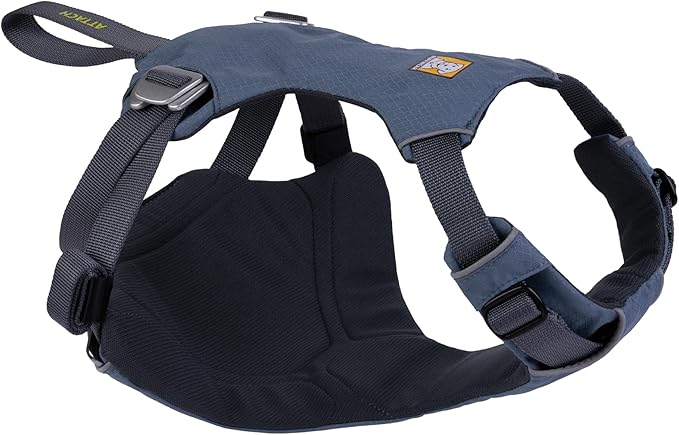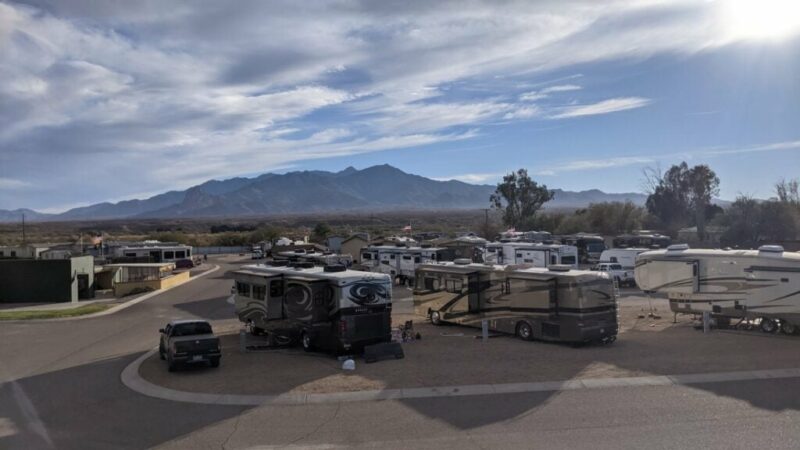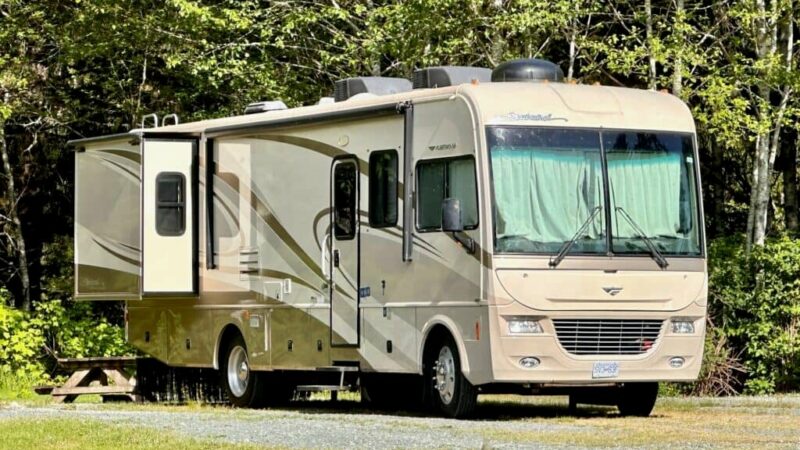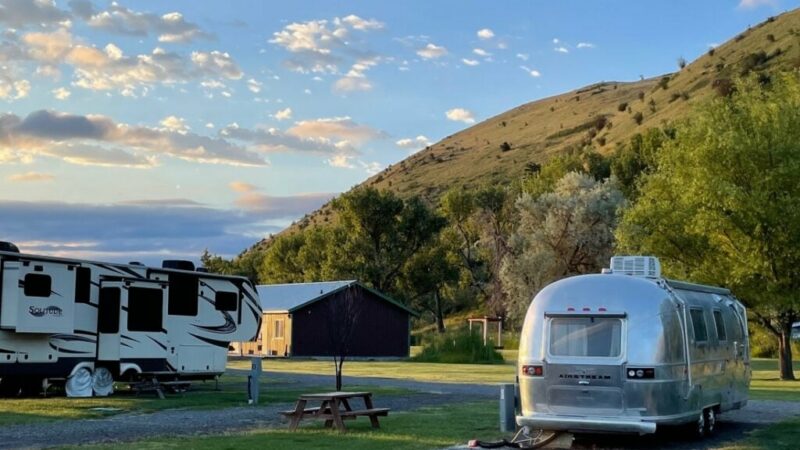RV Laws You Should Know Before Hitting the Road

11 RV-Related Laws You Might Not Know About
When it comes to the law, what you don’t know can get you into a heap trouble. Ignorance is no excuse. With that being said, RV-related laws tend to vary greatly from state to state. So much so that it can be hard to keep up with exactly what the law is sometimes, especially as we travel through multiple states. It’s pretty safe to say that no RV traveler wants to unwittingly attract the attention of police or highway patrol officers. But not to worry, we’ve compiled a list of state road laws that are commonly broken by RVers.
1. Resting overnight in an RV at a rest area
As RVers, we all have times when we just need to pull into a rest area and have a nap. While a quick nap may be fine in many states, you may get into trouble in both New York and Florida if you sleep for more than three hours at a rest stop. In other states, the legality of an overnight stay in your RV could violate local county or city ordinances. It’s better to check ahead of time than to wake up to a police officer banging on the door in the middle of the night.
That being said, driving when you’re tired is hazardous. There are still a lot of places RVers can pull over for some shut-eye without getting into trouble. Here are a few examples:
- Rest areas in many states (usually up to 8 hours)
- Flying J or Love’s Travel Centers
- Some Walmarts
- Cracker Barrel locations
- Some Boondockers Welcome and Harvest Hosts locations
Wherever you are in the US or Canada, even if it’s legal to park overnight in your RV at a rest area, it is illegal to camp overnight. The difference between parking and camping is that parking overnight means you are using the rest area for resting in your RV. This means you don’t deploy your camping chairs, awning, or slideouts. And you certainly shouldn’t bring out the portable fire ring or barbecue.
Camping overnight in your RV is more about getting outside the rig and relaxing with some or all of the goodies and gadgets you bring for camping. Resting overnight in your RV is contained within your RV. Camping at any spot designated for resting overnight is always frowned upon for many good reasons.
2. Living in your RV on your own property full- or part-time
At one point or another, a lot of fulltime RVers dream of buying that perfect piece of property to park their rig on for either part of the year or year-round. It seems like a great idea. However, the zoning bylaws in many municipalities don’t allow living in an RV—even if it’s parked on your own rural or semi-rural property.
That doesn’t mean it can’t be done, though. You just have to add the ability to stay in your RV to your list of requirements for the ideal property and check out more remote areas. If you want to live in an RV on your own property, you’ll need to do your research and ensure the area where the property is located isn’t affected by local ordinances.
3. Being distracted behind the wheel
DIstracted driving kills thousands of people every year. For this reason, distracted driving is illegal in all 50 states of the US. Some states such as Maryland and Massachusetts have a ban on all handheld devices in motor vehicles. Texting and driving is illegal in 48 states, with the exception of Missouri and Montana. However, distracted driving isn’t just about using electronic devices in your RV. In many states, changing the radio station, eating, driving with a pet on your lap, or anything else that takes your mind off the road (even momentarily) can cause enough of a distraction to get you in an accident and/or into serious trouble with the law.
4. Windshield-mounted GPS devices
WIndshield-mounted GPS devices can be a handy navigation tool. However, they are banned in 28 states and are the subject of strict regulations in other states. That’s because anything mounted to the windshield is going to at least partially block your view of the road.
Dash-mounted GPS navigation systems are acceptable as long as they aren’t creating a distraction while you drive. So, If you have a windshield-mounted GPS navigation system, it makes good sense to relocate it to your dash if you plan on driving in a state that bans them. This is easy to do, using a plastic disk that mounts on the dash, or a bean-bag-type mount that has a rubberized surface to hold it in place.
5. Speed limits for motorized and towed RVs varies
If you think you’re OK simply driving at or under the posted speed limit, think again. Five states have special speed limits for RVs. Here are the states where you’ll need to reduce your speed in your RV in order to avoid a traffic ticket:
- Montana: 65 mph
- California: 55 mph
- Idaho: 70 mph
- Indiana: 65 mph
- Montana 70 mph
- Washington: 60 mph
6. Is your RV too big?
Every state has restrictions on the length, width, height, and weight of the RV-and-vehicle combination that you’re allowed to bring onto the roads. As an example, here are the size restrictions in Alabama:
Alabama RV restrictions
- Total length: 57′
- Trailer Length: 28′ 6″
- Motorhome Length: 45′
- Width: 8′ 6″ (excluding mirrors and safety equipment, and appurtenances up to 6 inches attached to a motor home, travel trailer, self-propelled camper or house car, truck camper, or RV)
- height: 13′ 6″
Click here to find information about state road laws for each state in RV Trip WIzard.
7. Many states require RVs to carry certain safety equipment
It always makes good sense to carry safety equipment like flares, cones, and other hazard warning markers. Did you know that most states have rules for carrying certain safety equipment in your RV or tow vehicle? For example, Alaska requires RVs to carry safety chains, a breakaway switch on towed vehicles/trailers weighing more than 3,000 pounds, flares or reflective signs, plus brakes are required on towed vehicles/trailers weighing more than 5,000 pounds. Click here for a full listing of required RV safety equipment for each state.
8. Seat belt laws
One of the best things about a motorhome (for passengers) is being able to unbuckle the old seat belt to grab a drink from the fridge or use the washroom while your traveling, right? Not so fast! Laws regarding this vary from state to state, but for the most part, everyone needs to be buckled in when the RV is in motion. If you get caught for this, fines can be hefty. For example, North Carolina will ding you $160.
9. Licensing requirements
Every state has its own mandatory requirements for licensing and endorsement for driving or towing an RV. For instance, drivers with RVs longer than 45 feet long require a CDL in Wisconsin, while all drivers of RVs heavier than 26,001 pounds require a CDL endorsement in Washington. Fortunately, these requirements only apply in your home state. However it’s always a good idea to check the laws in your state

10. Dog Restraints
Most people know better than to drive with a pet on their lap. However, there are a lot of RVers who have a dog that rides next to them, enjoying the view from the passenger seat. It’s good to be aware that some states have laws requiring dogs and other pets to be restrained with a seat-belt harness or crate in any motor vehicle. It makes sense when you think about it (and it’s safer for everybody involved). These are the states that require pets to be restrained in the RV:
- Alabama
- Arizona
- California
- Colorado
- Conneticut
- Delaware
- Florida
- Hawaii
- Illinois
- Kentucky
- Louisiana
- Massachusetts
- Maine
- Michigan
- Minnesota
- Mississippi
- Montana
- Nebraska
- Nevada
- New Hampshire
- New Jersey
- New York
- North Carolina
- Ohio
- Oklahoma
- Oregon
- Pennsylvania
- Rhode Island
- South Carolina
- Tennessee
- Texas
- Virginia
- Washington
- West Virginia
- Wisconsin
- Wyoming
11. Traveling between states with firearms, cannabis, or CBD products
Every state has its own set of laws regarding firearms, marijuana, and CBD products. In addition, crossing the border to Canada with any of these items could get you banned in certain circumstances. Even if you aren’t headed into Canada traveling into some states with firearms, marijuana, or CBD products can get you into hot water … or worse!
Location is Everything
We’re subject to the laws and regulations of whichever state we’re in. No one gets an exemption just because the law is different in their home state. Breaking the law (even if you don’t mean to) can result in fines and even jail time. Either of those can be a buzzkill when it comes to enjoying what’s supposed to be a fun vacation.
Fortunately, getting fined or thrown in jail are always avoidable. Researching the laws of your destination as well as those states you’ll travel through on your way there is the only way to go. That way you’ll stay on the right side of the law.
The post RV Laws You Should Know Before Hitting the Road appeared first on RV LIFE.
Source: https://rvlife.com/rv-laws-are-you-breaking-any-of-these-11-rv-related-laws/






